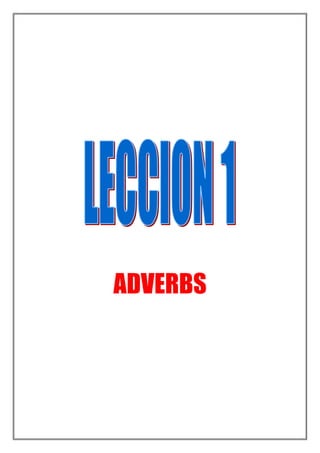Este documento explica los diferentes tipos de pronombres indefinidos en inglés y sus reglas gramaticales. Explica que los pronombres indefinidos no se refieren a personas, cosas, lugares o cantidades específicas. Luego lista los diferentes pronombres indefinidos y proporciona ejemplos de su uso. Finalmente, resume las dos principales reglas gramaticales sobre el uso de los pronombres indefinidos: 1) los pronombres indefinidos en singular llevan el verbo en singular y 2) los usos de pronombres compuestos con "some", "any" y "no" en fra
















![That is the girl whose parents got divorced last year. (Esa es la chica cuyos
padres se divorciaron el año pasado.)
Paul, whose wife just had a baby, will not be at work for a few weeks.
Paul, whose wife just had a baby, will not be at work for a few weeks. (Paul,
cuyo esposa acaba de tener un bebé, no irá a trabajar durante unas semanas.)
Nota: Puede omitirse el pronombre relativo cuando es el objeto de la frase.
Ejemplos:
The exam I took this morning won't be corrected and returned until next week.
The exam [that] I took this morning won't be corrected and returned until next
week. (El examen que hice esta mañana no se corregirá ni se devolverá hasta la
semana que viene.)
The woman I'm dating is a teacher.
The woman [who] I'm dating is a teacher. (La mujer con quien estoy saliendo es
profesora.)
When and where
Ejemplos:
The university where I teach is an excellent school.
The university where I teach is an excellent school.(La universidad donde
enseño es una escuela excelente.)
Can you tell me when is the best time to call?
Can you tell me whenis the best time to call?(¿Puedes decirme cuando es la
mejor hora para llamar?)
RelativeClauses (Cláusula relativas)
Se utilizan los pronombres relativos para unir dos o más cláusulas y formando así lo
que llamamos "cláusulas relativas". Hay dos tipos de cláusulas relativas: las que añaden
información adicional y aquellos que modificar (o definir) el sujeto de la oración.
Non-definingRelativeClauses
Estas cláusulas agregan información adicional. Se utiliza comas para separar la cláusula
relativa del resto de la oración.
Ejemplos:](https://image.slidesharecdn.com/cuadernocuarto-120314185832-phpapp02/85/Cuaderno-cuarto-17-320.jpg)


